Assassin’s Creed: Unity Review
The Assassin’s Creed franchise has long become a staple for publisher Ubisoft. Despite some concerns about the ability of the series to deliver every holiday season, it has carried on, and with the launch of the new consoles comes an opportunity to push the gameplay forward. While last year’s great AC IV: Black Flag was a simple port to the Xbox One and PS4, this year’s Assassin’s Creed: Unity is its own experience. It’s a game designed purely for the next generation, carrying with it high hopes and fan expectations to make a strong start into a new Creed era. And while Unity is a solid experience, gameplay mechanics are hardly groundbreaking and troublesome technical issues keep the game grounded.
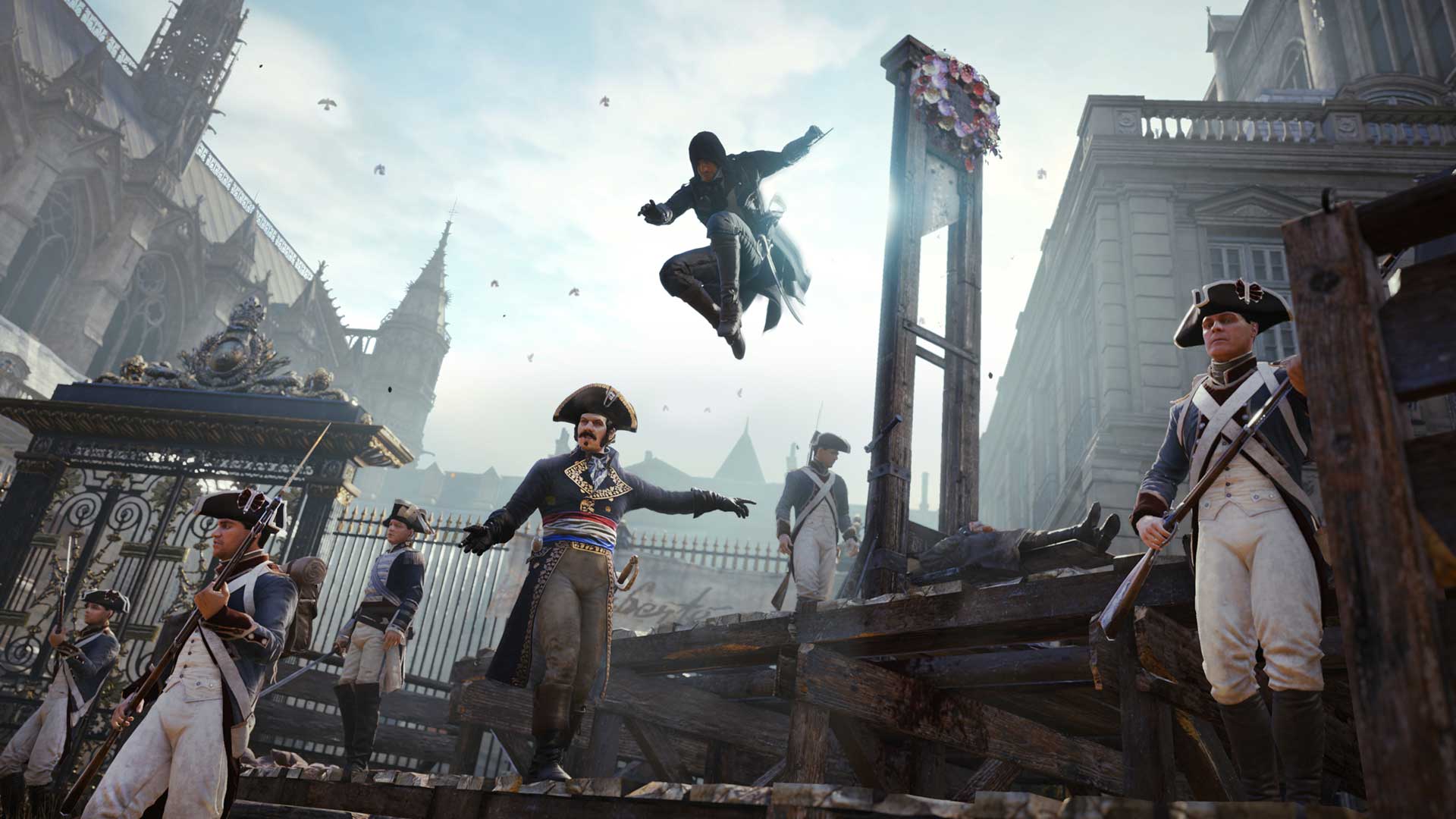
As is customary to the franchise, Unity sees players partake in an important historical timeline, this time around the French Revolution in the 18th century. Players become Arno Dorian, a young man whose father is murdered during his childhood. Arno is then adopted, and meets Elise De LaSerre, whom he grows up with and subsequently falls in love. Years later, her father (Arno’s adopter) is also murdered, and soon Arno finds himself on a path of revenge. As is somewhat expected, we learn that Arno’s father was a member of the Assassin Order. But in an interesting twist, Elise reveals that she and her family are with the Templars. Thus the narrative follows to the usual struggle between the two factions, with Arno seeking revenge for his father’s death by joining the Assassins and rising through the ranks.
Having two main characters romantically involved on opposite sides of the conflict creates an interesting dynamic not yet explored by the franchise. Both Arno and Elise are driven by their ideologies and desire to uncover the truth, and use the respective orders to accomplish their goals. The story is helped by focusing on a few lead characters, rather than overwhelming the player by numerous historical figures that come and go. It’s also briskly paced, and doesn’t have the problem of too many subplots. Arno and Elise create an engaging dynamic, and following their tale of revenge and love is interesting. However, that’s not to say the dialogue or the plot itself is anything extraordinary. And despite the French setting and Ubisoft being a French company, characters still possess a thick British accent.
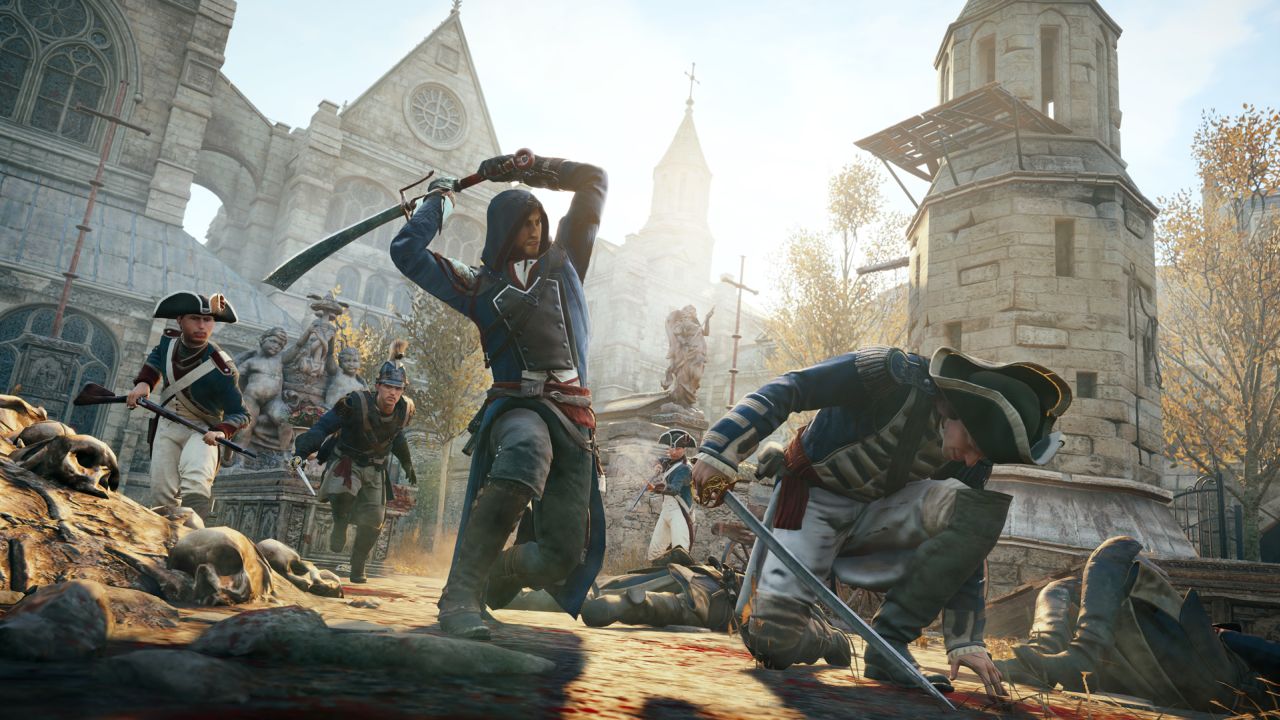
But what of the French Revolution? Sadly, unlike previous games, Unity doesn’t really involve Arno in the historical events. The societal struggle is only sometimes touched upon, and mostly serves as a backdrop to the private story of Arno and his life, rather than the tale of a nation. We only observe moments of chaos that erupt on the streets through specific missions, and with many locations on the map always featuring protests, the game world doesn’t always feel like it’s changing. The game’s story missions feel similarly disconnected from the main narrative. Like Altaïr before him, Arno is often running errands for the Assassins rather than trying to accomplish his own personal goals that made him join the Order in the first place.
The main story missions are a typical Assassin’s Creed affair. You’re going to be climbing and fighting your way to objectives, speaking with important characters, and performing targeted assassinations. Here is where Unity does shine, and stands above its direct predecessors. The assassination missions play out like stealth assignments, where Arno starts off on the edge of a restricted area, and must find a way to his target. The game presents numerous optional objectives that allow the mission to play out in different ways. For example, you can pickpocket a guard to gain keys, and get into the building via rooftop access. You can free some prisoners to help you fight through the guards, or just use the chaos as distraction. Or, you can cover the sewer vents to reduce visibility inside when you eventually venture in. These alterations to the missions help create a dynamic feel to the gameplay, and offer lots of replay value. Sometimes these optional tasks significantly alter the path of the mission, and at other times they are merely distractions that do little to help your progress.
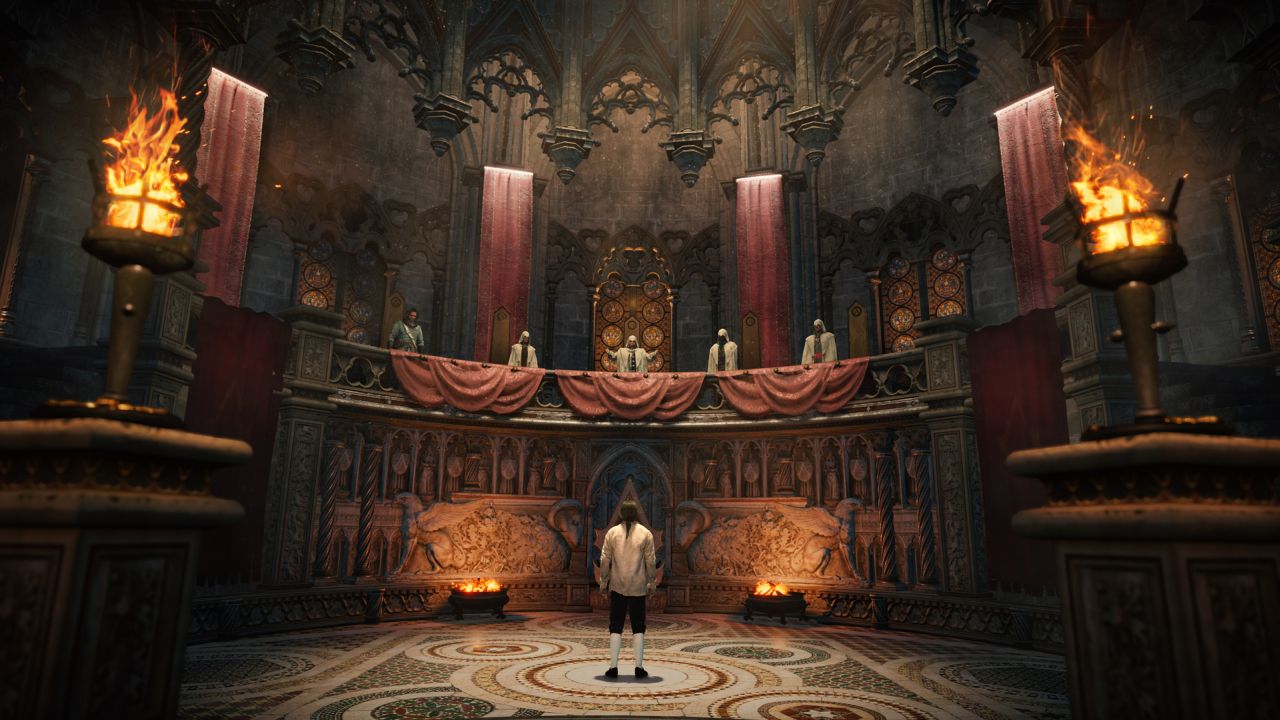
While you can fight your way to the target, stealth is usually more rewarding. Thankfully, for the first time a dedicated stealth button has been added that makes Arno crouch and be able to stick to cover. The controls can be a bit awkward at times, but for a franchise that’s so focused on stealth, it’s a wonder it took so long to add. Other notable gameplay changes include revamped combat and parkour mechanics. Your melee options include the usual dodge, parry, and shoves, and they have been rebalanced and are a bit more challenging than before. Arno’s phantom blade acts similarly to the dart gun from Black Flag and provides a silent, long-range weapon for more flexibility. Finally, the parkour does feel vastly improved when it works, letting you hop to and from ledges at odd angles and perform maneuvers previously impossible. At the same time, there are many frustrating occasions where the game refuses to cooperate and flings our hero to his death, or right into a group of foes. It’s growing pains for the new traversal mechanics, and while they are impressive at the outset, you will miss the completely polished experience from last gen.
Improving your skills and acquiring new gear has been streamlined and made more progression-based than before. You earn cash to purchase new weapons and clothes, which now carry a multitude of stat boosts, from better stealth to increased Eagle View range and duration to higher HP. The crafting systems are gone, and all items can be purchased almost anywhere outside of combat. Most gear is also upgradable, using Creed Points. These points are earned by performing various gameplay tasks, such as stealthy takedowns or successful escapes. You’ll usually have plenty of Creed Points, but cash seems much harder to come by.
Despite completing a wealth of random events, missions, and owning a couple of upgraded profit-generating buildings in the city, we were only able to keep Arno moderately outfitted to match the district difficulty rating. That’s because it feels like the game is making it much more difficult to acquire cash, and your ammunition refill costs are quite high. But every weapon and clothing item can also be bought with Helix Points as well. These are an arbitrary currency that can be only gained with real cash purchases. With point packs ranging from $10 to $100CAD, this marks the introduction of microtransactions to the Assassin’s Creed franchise. While Unity is still not an overly challenging game, and it’s entirely possible to complete it without spending a dime of real cash, there’s certainly a pinch that players will feel when it comes to their finances. Earning some of the elite level of gear would likely take hours and hours of grinding and replaying missions, and while that ultimately won’t affect most players, it’s disappointing to see the franchise head into such a direction.
Finally, Assassin Points are essentially skill points used to unlock new gameplay abilities, such as double assassinations, or a new ability to temporarily disguise yourself as an enemy and pass by undetected. These points are earned only via mission progression to help with pacing. On the whole, Unity is the most customizable Assassin’s Creed game ever, from gameplay to gear, it often feels like a full-fledged RPG experience.
The biggest reason for this new progression structure is having all your abilities and gear carry over into the new cooperative multiplayer. For the first time, rather than playing online-specific competitive modes in the past games (which are notably absent), Unity offers various missions and heists for up to four players to undertake together. The missions are well designed, with a multitude of pathways for each player and coordination a key requirement for success. You can also utilize unique co-op boosts that will help the whole team survive, evade or fight more effectively. Playing with random partners carries the usual risk of someone going rogue. Get a few friendly faces together, however, and the experience can be incredibly rewarding. With some strategy, such as speccing each player to a certain style (be it ranged, stealth, or brute force), and in-game coordination, the missions can be as great, or even more so than the campaign. Cooperative missions also feature short narratives, and they are surprisingly engaging, giving real urgency to your actions. The thrill of coordinated attacks, taking different paths through a level, and playing with a tight knit team is extremely pleasing.
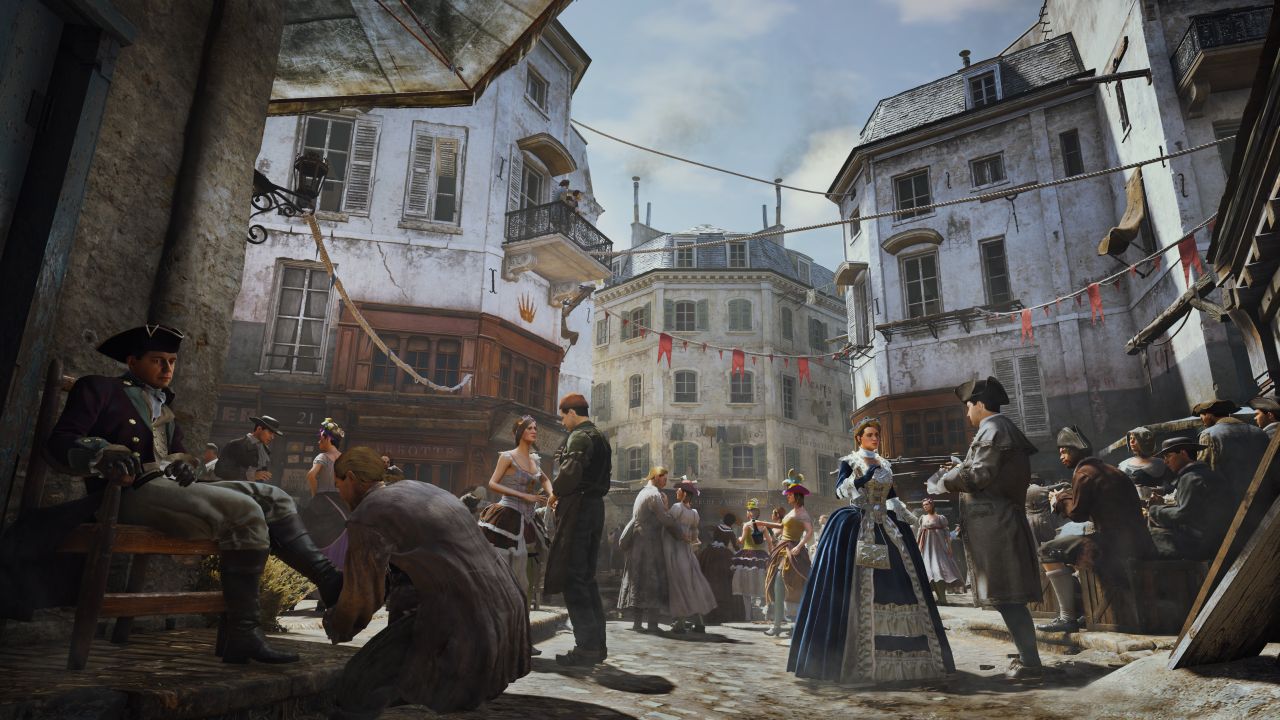
In the vast open game world of Paris, there’s the usual assortment of bite-sized activities. One new type of loot chest is annoyingly inaccessible unless you play the game’s companion app. A new side mission type is murder investigations, as Arno observes clues and speaks with various witnesses before making accusations. You’ve also got puzzles to solve, random events to complete such as stopping street harassment or chasing down thieves. Time Anomalies are located across the city, transporting Arno into a later century Paris where you perform various parkour challenges in order to rescue other agents of the Order. It’s a unique concept, but the resulting gameplay is disappointing and has little bearing on the overall experience. These time anomaly missions also crop up during the campaign, but there you are tasked with completing a linear (but often thrilling) platforming sequences.
This is also the only real connection the game makes to the dreaded modern-day storyline. Your whole purpose of following Arno is because he was supposed to come across a Sage during his lifetime, who Abstergo (Templar) agents are hunting across different time eras. With the DNA of a Sage, it is said that the corporation will be able to alter history. You’ll get a few cutscenes from within the Helix, and the hacking crew of previous games will tell you about what terrible deeds Abstergo is planning, but that’s about it. Considering how unnecessary the modern-day concept has become over the years, it’s good to see we are moving slowly but surely towards its complete absence.
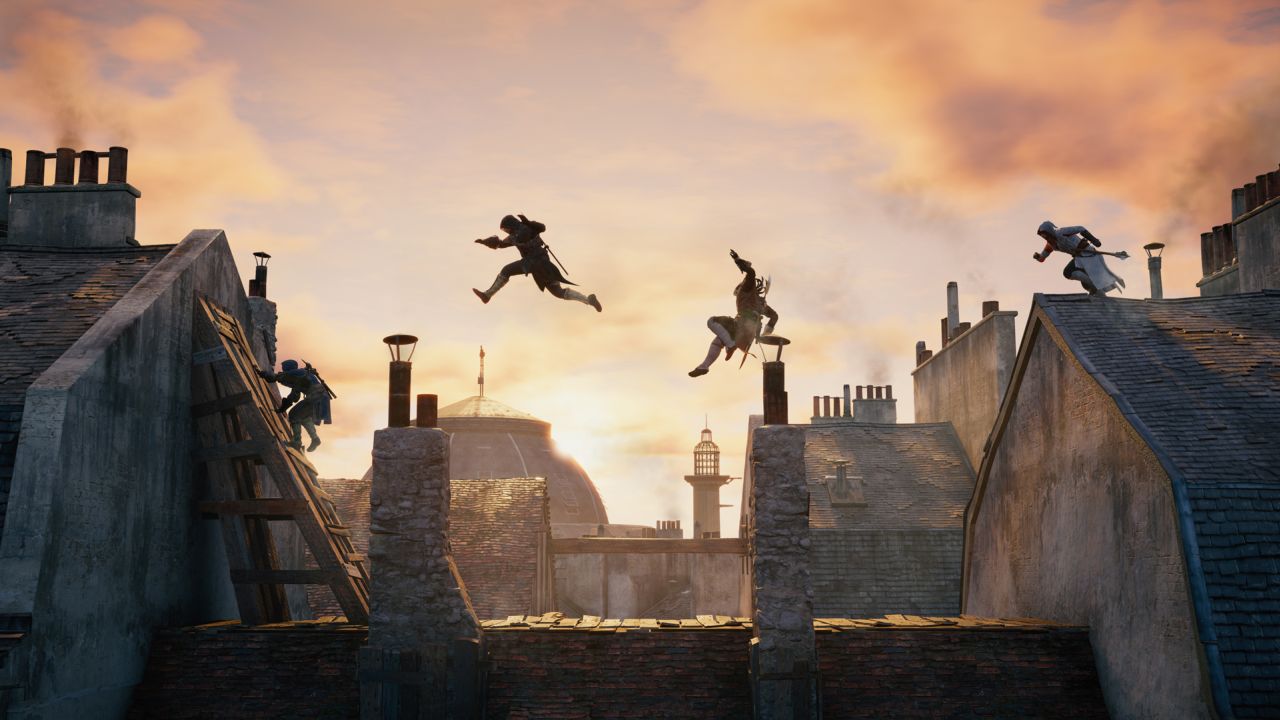
Assasin’s Creed: Unity marks the debut of the AnvilNext engine, and there’s certainly potential in its prowess. The streets of Paris pack more NPCs than ever before; some of the facial textures and animations during cutscenes are impressively lifelike. The amount of indoor environments in this open world title (still without loading screens while traversing the city) is truly an impressive technical feat. The lighting quality can be striking, especially in many of the wildly detailed and numerous indoor environments. Roaming the streets, players will be in awe of the level of detail, number of citizens, and large amount of enterable buildings.
And while the above aspects are impressive, the new engine also struggles noticeably in many areas. The new parkour mechanics and enterable buildings allow players to run right through windows and emerge on the other side. Sadly, Arno often refuses to enter windows and needs careful maneuvering just to get inside. Walking the streets isn’t very efficient, because the crowd severely restricts your movement, and there is the new enemy group that will be hostile to Arno on sight, regardless of your actions. Plus, enemies usually won’t climb to follow you onto rooftops, so escape is easy.
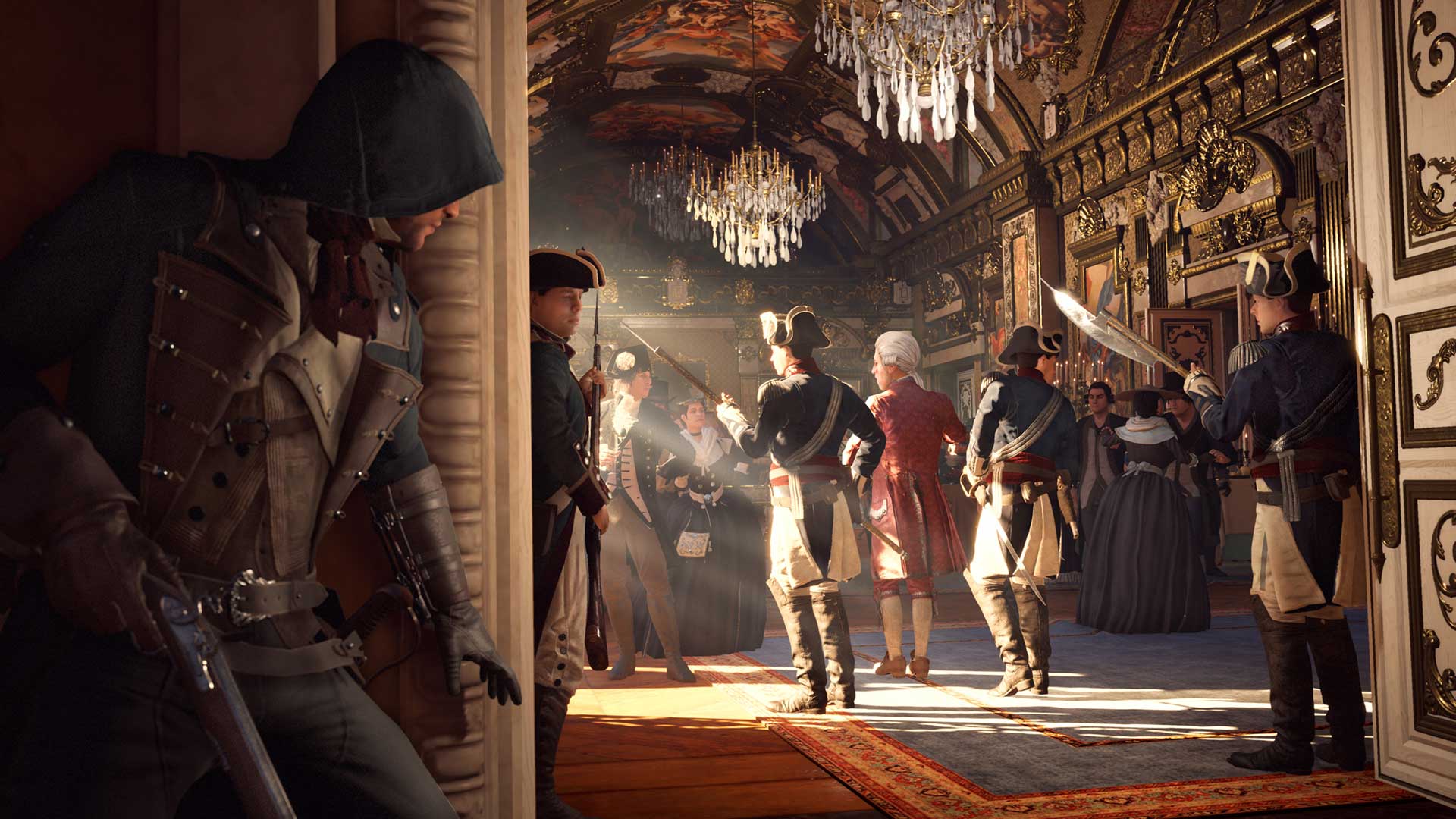
The visuals, too, can be quite rough. As mentioned, the environments can be impressive combined with great lighting, however there are framerate problems throughout the game. From cutscenes to combat, the game slows down notably at times. Texture streaming problems create ghastly scenes on the streets, as NPCs appear out of thin air and their textures only load when you approach. If you sprint, the game is often unable to keep up rendering all the citizens properly, and the effect is quite jarring and ugly. Unity is easily the most visually inconsistent title to date on Xbox One. Other issues include an overabundance of information popups that often appear out of context or with poor timing. Other occasional floating characters, physics and clothing glitches are also present.
Assassin’s Creed: Unity is a solid experience, but one that feels underwhelming as a supposed true next-generation title. The improved gameplay mechanics are accompanied by an okay story and thrilling cooperative play. However, the new engine seems to struggle, and the excellent level of environment detail is lost in the muddy and slow loading textures and unstable framerate. If you’re interested in the multiplayer aspects of Unity or its historical setting, the game is easy to recommend. Solo players not usually interested in the franchise, however, probably won’t find much here that will change their mind.
